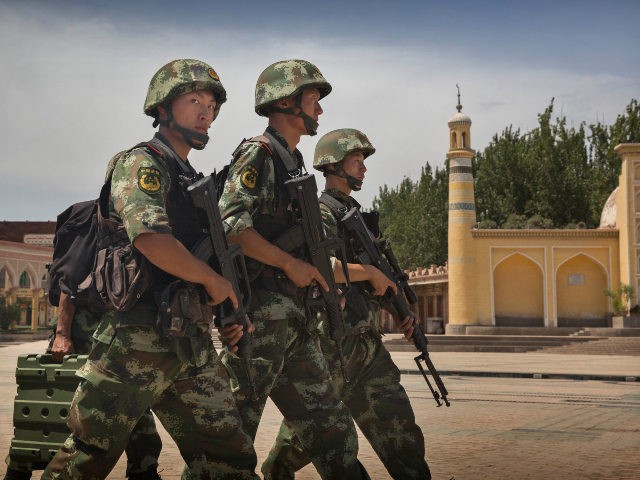Videos surfacing on social media on Tuesday revealed a massive uprising in southwestern Yunnan province, China, in which thousands of people attacked armored riot police preventing them from entering a mosque the Communist Party has targeted for demolition.
The videos – whose location was verified by the Associated Press and CNN, among others – show Hui Muslims attempting to enter the mosque for afternoon prayers, running into a solid wall of riot police. Blocked from worship, the crowd begins attacking the Communist Party officers with rocks, water bottles, bricks, and other projectiles. Radio Free Asia (RFA) reported that the crowds confronting the police did so in response to reports that the government was planning to demolish the mosque’s dome that day.
CNN, one of the organizations that verified the videos were filmed in Yunnan, reported on Tuesday that unnamed sources within Yunnan estimated at least 30 arrests on Saturday – and waves of crackdowns in subsequent days. The sources said that the protesters attacked police only after riot officers began beating people with sticks, outraging the would-be worshippers.
One such source said the incident began when visitors preparing to attend afternoon prayers noticed demolition gear around the site.
网友投稿
5月27日上午,云南省玉溪市通海县纳家营清真寺外,当地穆斯林与警察发生激烈冲突。
网传冲突原因与政府打算强拆清真寺有关。 pic.twitter.com/Dr34EI82Wm— 李老师不是你老师 (@whyyoutouzhele) May 27, 2023
“After arriving at the mosque, we realized that they had driven the cranes into the compound and were ready for the forced demolition,” the unnamed source told CNN.
A local anonymous source similarly told the Qatari news outlet Al Jazeera that the crowd organized after Communist Party officials “pushed ahead with plans to raze four minarets and the dome roof of the 13th-century Najiaying Mosque.” Voice of America, also reporting on the incident, noted that videos appeared to indicate that the protesters succeeded in part in destroying a scaffolding put in place to begin the demolition of the dome.
云南通海纳家营,武警包围清真寺🕌️禁止民众进入 pic.twitter.com/HLYk0c1KXx
— 马聚 (@majuismail1122) May 27, 2023
Police ultimately let the crowd enter the mosque but, following the incident, Yunnan reportedly deployed thousands of officers to surround it, greatly escalated drone surveillance attempting to identify protesters, and called for anyone participating in the riot to turn themselves in to police, where they will likely endure severe human rights abuses in China’s brutal, and arbitrary, “legal” system. The crackdown reportedly intensified on Tuesday after crowds surrounded the mosques over the weekend on a 24-hour basis to prevent its demolition.
The incident occurred in the village of Najiaying, outside the village’s mosque, which was built in 1370. The Communist Party’s nominal objection to the mosque is that, during a full remodel in 2004, the facility was redesigned to appear more in line with the architecture of Middle Eastern mosques, most prominently including the construction of a dome and expansion of its central space and minarets, towers used to broadcast the Muslim call to prayer. Prior to its renovation, the mosque’s architectural style more closely resembled Chinese temples of other faiths.
Voice of America reported that a local court judgment ruled the building illegal in 2020, citing building code violations.
The Chinese government regularly uses building codes to destroy places of worship. Throughout much of the past five years, the Communist Party focused on erasing Christianity from the country, accusing churches of violating building codes and demolishing them or removing their crosses to render them unrecognizable as houses of worship. Unlike Christianity, which is prevalent nationwide and across ethnic groups, Muslim communities primarily exist in western, occupied East Turkistan and in southwestern areas such as Yunnan, home to a sizeable population of Hui Muslims. The Muslims of East Turkistan are largely members of Turkic ethnic groups, most prominently the Uyghurs; Hui Muslims are ethnically Han Chinese.

A protester from the Uyghur community living in Turkey stands with flags in the Beyazit mosque during a protest against the visit of China’s Foreign Minister to Turkey, in Istanbul on March 25, 2021. (BULENT KILIC/AFP via Getty Images)
The government destruction of mosques – and other sites of religious significance, such as cemeteries – in East Turkistan has been going on for at least five years and is part of a broader campaign of genocide against Uyghurs and other Turkic peoples. Beijing has often used its relatively more lenient treatment of Hui Muslims to dispute the extensive evidence of genocide in East Turkistan, but appeared to begin changing that policy and cracking down on the Hui early this year.
CNN and RFA reported that, on Sunday, local authorities posted a warning online demanding anyone attempting to protect the mosque “immediately stop all illegal and criminal acts” and those in the crowd confronting riot police surrender within a week or face grave legal consequences.
“Those who voluntarily surrender [by June 6] and truthfully confess the facts of violations and crimes may be given a lighter and mitigated punishment according to law,” the statement reportedly read, according to CNN’s translation.
Reports indicate that the area around Najiaying has been flooded with government surveillance drones and locals have lost access to the internet. The Catholic outlet AsiaNews reported on Tuesday that communist censors have blocked searches for “Najiaying Mosque” on the regime-controlled Weibo social media outlet in an attempt to prevent videos of police abuse from spreading within the country.
The protest this weekend is the latest in a string of anti-government manifestations that have greatly escalated in frequency throughout China, occurring in nearly every part of the country and including apparently every social group. The human rights organization Freedom House revealed in February that it had documented over 1,000 protests in China between June and December 2022 and that at least 23,000 people in China had participated in them.
“Not only is dissent in China frequent, it’s also widespread. Since June, people have protested in nearly every province and directly administered city,” Freedom House detailed in November, prior to its more expanded report on protests in 2022. “Moreover, even as authorities make every effort to prevent protestors from connecting, we found many instances where people manage to form decentralized movements that increase the impact of their dissent.”
Many of those protests occurred on the last weekend of November when a protest movement against China’s totalitarian “zero-Covid” policies erupted. Thousands of protesters in nearly every major city took to the streets to demand an end to deadly lockdowns, imprisonment in quarantine camps, and other policies. Many protested by holding up a blank piece of paper, defying police to arrest them for saying nothing.
WATCH: China: Hundreds Protest Communist Censorship by Holding Up Papers Saying… Nothing:
The Communist Party announced that it would “optimize” its “zero-Covid” policy shortly after the protests, but that did little to deter protests against communism on other grounds. The Hui protests follow a particularly vocal resistance movement organized by elder Chinese citizens known as the “White Hair” protests. Beginning in Wuhan, China, the origin city of the coronavirus pandemic, elderly protesters flooded the streets in February to protest the Communist Party cutting their health insurance benefits. The “White Hair” protests soon spread to Dalian.

COMMENTS
Please let us know if you're having issues with commenting.